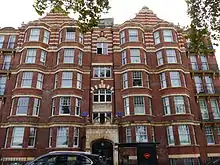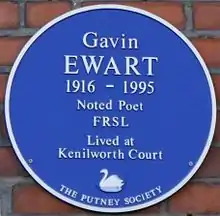Gavin Ewart
Gavin Buchanan Ewart (4 February 1916 – 25 October 1995) was a British poet[1] who contributed to Geoffrey Grigson's New Verse at the age of seventeen.


Life
Ewart was born in London and educated at Wellington College before entering Christ's College, Cambridge where he received a B.A. in 1937 and an M.A. in 1942.
After active service as a Royal Artillery officer during World War II, he worked in publishing and with the British Council before becoming an advertising copywriter in 1952. He lived at Kenilworth Court in Putney, London, and a blue plaque at Kenilworth Court commemorates this.
Poetry
From the age of 17, when his poetry was first printed in Geoffrey Grigson's New Verse, he acquired a reputation for wit and accomplishment through such works as Phallus in Wonderland and Poems and Songs, which appeared in 1939 and was his first collection.
The Second World War disrupted his development as a poet, however, and he published no further volumes until Londoners of 1964, although he did write the English lyrics for the "World Song" of the World Association of Girl Guides and Girl Scouts. From 1964 he produced many collections, which included The Gavin Ewart Show (1971), No Fool like an Old Fool (1976), All My Little Ones (1978), The Ewart Quarto (1984), The Young Pobble's Guide to His Toes (1985), and Penultimate Poems (1989). The Collected Ewart: 1933-1980 (1980) was supplemented in 1991 by Collected Poems: 1980-1990.
The intelligence and casually flamboyant virtuosity with which he framed his often humorous commentaries on human behaviour made his work invariably entertaining and interesting. The irreverent eroticism for which his poetry is noted resulted in W. H. Smith's banning of his The Pleasures of the Flesh (1966) from their shops.
As an editor he produced numerous anthologies, including the Penguin Book of Light Verse (1980). He was the 1991 recipient of the Michael Braude Award for Light Verse.
Ewart's life and poetry are the subject of a book entitled Civil Humor: the Poetry of Gavin Ewart by Stephen W. Delchamps (Fairleigh Dickinson University Press, 2002).
Honours
- Cholmondeley Award, 1971
References
- "Gavin Ewart". Poetryarchive.org. Retrieved 18 December 2016.
External links
| Wikiquote has quotations related to: Gavin Ewart |
- Obituary by Anthony Thwaite in The Independent, 24 October 1995
- Obituary (additional information) by David Gascoyne in The Independent, 25 October 1995
- "Archival material relating to Gavin Ewart". UK National Archives.

